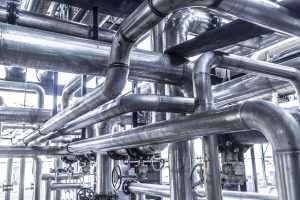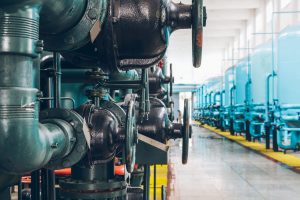Understanding the Effects of Hot Water on a Pump System
The use of Hydroflo pumps and other water pumping systems is relatively standard across the majority of industrial and commercial facilities. However, in most circumstances, basic operations require the pumping of cold water, a natural lubricant for the pump system, and only low-pressure components.
When a company requires the pumping of hot water, it needs to address viscosity and vapor pressure changes. The differences between water at 68 degrees Fahrenheit and 176 degrees Fahrenheit seem minimal in measurement. Still, the composition of hot water makes it lighter and less lubricating while drastically increasing the system’s pressure because of vaporization. The changes only increase the increasing water temperature, which means that companies must understand how these changes affect the pumping system and what changes need to occur to prevent damage or early deterioration of pump components.
The Effect of Heat on Pumps

Most pump operators are familiar with the net positive suction head available for a specific pump. However, do not trust the stated NPSHA on specific vertical turbine pumps without first purchasing an NPSH test for the exact operating conditions. While a pump manufacturer may claim an NPSH, the numbers are not guaranteed without a confirmation test because of variation in uses and how depth and temperature can impact different pump components.
Hot water systems have an increased risk of cavitation, which is the rapid change in water pressure leading to metal wear. As liquid accelerates through the suction pipe, bubbles form as the pressure drops. The system forces the water from the line to the impeller eye. The pressure suddenly increases, forcing the bubbles to collapse, creating a tremendous amount of localized pressure and causing minor abrasions on the metal propeller. A stainless steel impeller has more resistance to these moments of cavitation.
Expansion and Pipe Components
The majority of centrifugal pumps can handle the temperature and water fluctuations of 250 degrees Fahrenheit. Still, as temperatures rise toward 300 degrees Fahrenheit, these systems struggle to keep up with the dramatic expansion. When working with temperatures above 250 degrees Fahrenheit, professional organizations recommend using Hydroflo pumps with centerline-supported casing.
Using systems with specialized casings allow for thermal expansion from its center of rotation. The allowance for expansion out from the center means that components maintain the same axis throughout the pressure and temperature changes. Because these systems are not fixed to the pump base vertically, pump owners experience fewer alignment problems than other casing designs.
The Necessity of Balance

For operations above 220 degrees Fahrenheit, a balanced seal is necessary for all pumps, even submersible turbine pumps. The balance ensures the proper operation at higher temperatures, but even correct seal usage is no match for temperatures above 250 degrees Fahrenheit. When reaching such temperatures, companies should consider Viton, Ethylene Propylene, Aflas, or Kalrez. However, while some of these materials will help balance the system, anytime water reaches above 250 degrees Fahrenheit, the system requires additional cooling. While a cooling jacket can help, a flush is better.
Avoiding Bearing Failure
Some pump operators worry about the bearings in hot water applications, but the added concern is unwarranted with most systems. The obsession with cooling the bearing frame can often cause the damage operators want to avoid. Excessive cooling can cause condensation and contamination of the lubricating oil, which leads to early bearing failure. To prevent such damage, only use precautionary cooling measures in operations over 500 degrees Fahrenheit.
The Importance of Pump Selection
Despite the increased concern for hot water pumping, the process is not complicated. Selecting the appropriate Hydroflo pumps, cooling system, mechanical seals, and pipes will ensure prolonged operations. When selecting and customizing your pumping solution, the primary consideration is water’s changing properties in increasing temperatures. Understanding the viscosity and pressure of heated water can prevent system failure, which equates to a safer work environment for all involved.
There is no need to decide on a pumping solution on your own. A Zone Industries representative can help you calculate your company’s needs, ensuring that the pump can handle your hot water operations. Instead of wondering about pump design specifications, contact Zone Industries to go over your system requirements, allowing experts to assess your process and needs. With a consultation and system assessment, you can be confident in the final installation and operation.
Understanding the Effects of Hot Water on a Pump System | Zone Industries
